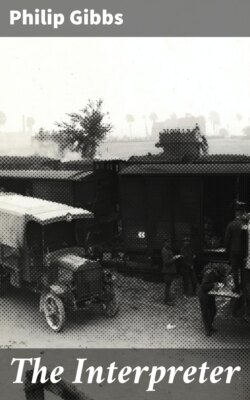Читать книгу The Interpreter - Philip Gibbs - Страница 14
На сайте Литреса книга снята с продажи.
12
ОглавлениеTable of Contents
On the day before his flight to Lisbon by a British military machine, Barton had to travel down to a west coast town from which he would begin his journey by air.
He had an afternoon in town after saying good-bye to his mother and Judy. His sister had hugged him at the garden gate and said gay words to him.
“Swat those isolationists, John. You’re England’s Ambassador Extraordinary for bringing America into the war—only don’t let them know that. Kiss the dear great man for me, and take care of yourself as much as possible. Don’t let the American women suffocate you under their warmth of hospitality.”
His mother had sent many messages to relatives and friends in America, especially to her sister in Boston and her family of four now growing up to be young men and women.
“You’ll have a grand time, John,” she told him. “Everybody knows your name. They’ll make a fuss of you.”
“I hate the idea of it,” he told her grumpily. “I can’t think why I’m going on this fool’s errand, to make a monkey of myself on public platforms.”
“Come back with an American Army,” said his mother. “Bring them over to help Britain. They’ll follow you.”
She was not talking seriously, being a little lady of great common sense. She knew that to her own people this war was a far-off thing, and of no vital concern to them, as they saw it.
Barton lunched that day in the Cheval Blanc. It was a useful rendezvous for saying good-bye to this bunch of men. They were all very friendly and encouraging. Even Dewhurst, that incurable ironist, did not pull his leg too much, and was quite affectionate when he gripped John’s hand when he rose from the luncheon table.
“We shall miss you, Barton. We shall miss your fine balance between our wild extremes. Have a good time. Don’t pile it on too thick about British heroism and nobility. Let ’em know we can’t win this war without American man power. How the hell can we, now that France is out of the picture?”
General Cowdray gave him a friendly nod and raised one hand in salute.
“I envy you, Barton. Nice trip on the Clipper, and a change of scene from this squalor of London.”
The patron of the restaurant was excited when he heard of Barton’s coming journey.
“You go back to the United States? Ah! Quelle chance! To get away from Europe—this jungle, this madhouse, this torture chamber. A thousand congratulations.”
“You have a great mission,” said a rare visitor to this table, one of the directors of the Treasury, whom Dewhurst singled out for particularly bitter jibes. He added some generous words.
“I’ve learned a lot from your broadcast talks. You will be able to tell your own people that we’re not doing so badly as it looks. Our attempts at getting the truth over to the United States have been pretty feeble. You will be our good interpreter.”
It was curious that he used that word—it had been used in the letter from Washington.
Barton felt touched by all this friendliness. The English weren’t so cold and icy as Americans thought. He had found that out years ago.
He turned at the door of this Soho restaurant with its little tables covered by checked cloths of blue and white squares like an eating house in Paris. Several followers of De Gaulle were lunching there, talking in low voices over their soupe à l’oignon, and two bottles of Mercurey. A young man was there with a pretty girl whose bare elbows were on the table, and whose clasped hands supported her firm little chin. Further down the room were two Tank officers and a young cadet in the Guards. A girl whom he knew as a typist in the Ministry of Information sat alone reading a novel propped up against the water jug, while she smoked a cigarette in a long holder and lingered over her coffee.
A restaurant in wartime London, with many ruins in its near neighbourhood. One night John had been there with Dewhurst during the blitz. The patron and the waiters had scurried down to the cellars, very frightened. He had been pretty scared himself. Now he would be leaving it for a time, but would carry with him the memory of extraordinary conversations, passionate criticisms, moods of despair, irony, wit, laughter, and intellectual comradeship. He had learned a lot about the English mind in this room which smelled of garlic, and onions, and French coffee, and stale tobacco smoke.
“Good-bye, Cheval Blanc,” said John Barton in his own mind.
He felt a bit morbid, like a man looking upon familiar things for the last time.
